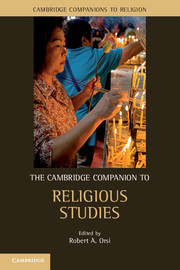Book contents
- Frontmatter
- Introduction
- Part one Religion and religious studies: the irony of inheritance
- 1 On sympathy, suspicion, and studying religion: historical reflections on a doubled inheritance
- 2 Thinking about religion, belief, and politics
- 3 Special things as building blocks of religions
- 4 The problem of the holy
- Part two Major theoretical problems
- Part three Methodological variations
- Index
3 - Special things as building blocks of religions
from Part one - Religion and religious studies: the irony of inheritance
Published online by Cambridge University Press: 28 March 2012
- Frontmatter
- Introduction
- Part one Religion and religious studies: the irony of inheritance
- 1 On sympathy, suspicion, and studying religion: historical reflections on a doubled inheritance
- 2 Thinking about religion, belief, and politics
- 3 Special things as building blocks of religions
- 4 The problem of the holy
- Part two Major theoretical problems
- Part three Methodological variations
- Index
Summary
Given that religion, religious, and religions are Western folk concepts, that their meaning is unstable and contested, and that they cannot be defined so as to specify anything uniquely, we need to consider broader, more generic ways of characterizing the sorts of things that interest us as scholars of religion. Rather than relying on emically loaded first-order terms, such as sacred, magical, spiritual, mystical, or religious, we can seek ways to translate the disciplinary second-order discourse of religion, religious, and religions into broader, more generic terms when designing research. Instead of stipulating a definition for a key first-order term, such as “religious,” and, thus, defining in advance what exactly will count as such, I propose – to borrow a fishing metaphor – that we cast our nets more broadly and then sort through the variety of things that our nets pull in. Identifying a broader set of nets that we can use – singly or in combination – to specify what it is we want to study would not only eliminate the confusion between first- and second-order use of the term “religious,” it would also highlight the impossibility of uniquely specifying what is meant by the first-order terms and force us to specify what it is about this constellation of concepts that most interests us.
SPECIALNESS AS A GENERIC ATTRIBUTE OF THINGS CONSIDERED RELIGION-LIKE
The idea of specialness is one broader, more generic net that captures most of what people have in mind when they refer to sacred, magical, spiritual, mystical, or religious, and then some. We can consider specialness both behaviorally and substantively, asking whether there are behaviors that tend to mark things off as special and whether there are particular types of things are that are more likely to be considered special than others.
- Type
- Chapter
- Information
- The Cambridge Companion to Religious Studies , pp. 58 - 83Publisher: Cambridge University PressPrint publication year: 2011
- 1
- Cited by



